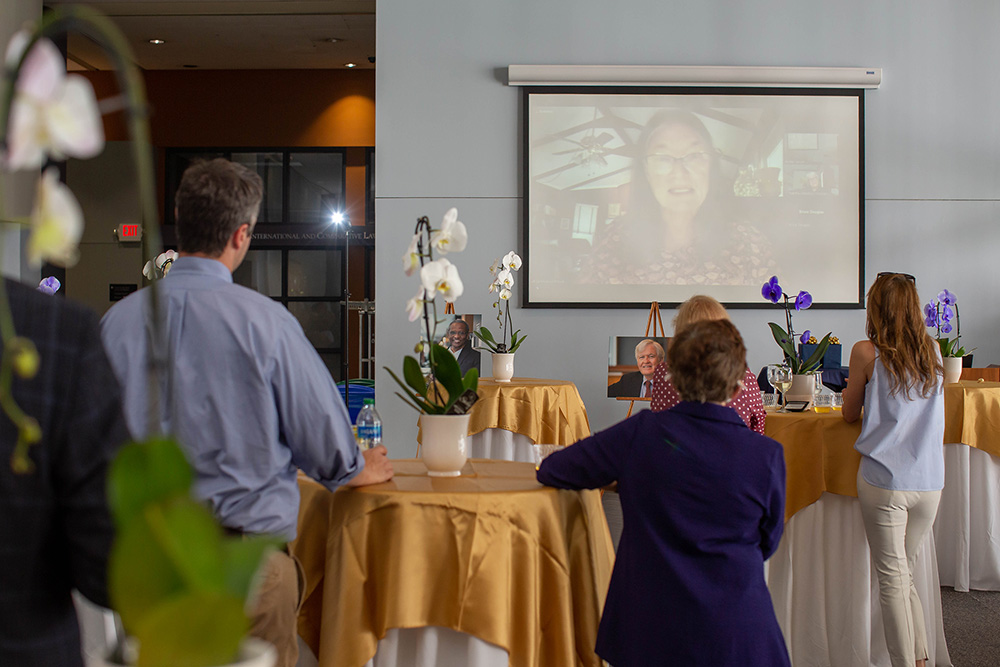Barbara Woodhouse
Emory School of Law Distinguished Professor

Unexpected career path leads to groundbreaking scholarship
Growing up poor in the woods of Cortlandt, N.Y., Barbara Woodhouse lived in a house built by her parents’ own hands. There was no running water or electricity, but the youngster had potent outlets to transcend privation. “We were poor in money, but rich in books and music,” she says. Woodhouse traveled to Italy — where college was cheaper — and earned a degree in Italian language, art and literature. It wasn’t until 1980, with her youngest child in primary school, that her husband suggested that she consider a career in law. When the couple adopted their son in 1973, they saw what a difference lawyers, judges and social workers made in the lives of special-needs and foster children. “It had never occurred to me that a girl could be a lawyer,” says Woodhouse, who enrolled at Columbia Law and took part in a pathbreaking multidisciplinary children’s law clinic founded by the renowned children’s welfare advocate Jane Spinak. “I had been drawn all my life to working with children, but I never imagined becoming a lawyer for children.”
The specialty took time to develop, with Woodhouse helping to lead the way. “When I started teaching law, the notion of representing a child as your client was so revolutionary that one senior colleague called it malpractice,” she says. “Now it’s mainstream.” Woodhouse credits her mentor, former Supreme Court Justice Sandra Day O’Connor, the first woman on the High Court bench, with helping her develop her legal sensibilities; Woodhouse clerked for O’Connor. After working in private practice and teaching law at the University of Pennsylvania and the University of Florida, Woodhouse joined Emory in 2009 as LQC Lamar Chair in Law, recently renamed to the Emory School of Law Distinguished Professorship. Her coursework centers on adoption, children’s rights, comparative and international family law, equality and the Fourteenth Amendment, and intimate partner violence.
Woodhouse has published more than 75 articles and book chapters, and she has written or co-written influential amicus briefs in many appellate courts, including the U.S. Supreme Court. Her latest work has focused on the comparative ecology of childhood in the United States and Europe. Woodhouse’s most recent book is The Ecology of Childhood — How Our Changing World Threatens Children’s Rights (New York University Press, 2020). The International Journal of Children’s Rights called the work “groundbreaking in providing a solid account of the theoretical model as it applies in today’s world, complemented throughout by perspectives and narratives from actual children.”
“Barbara is a great teacher because she has a heart for her subject matter and for her students,” says Randee Waldman, director of Emory Law’s Barton Juvenile Defender Clinic. “She has a deep dedication to children’s rights, and to training the next generation of lawyers to advocate for those rights.” Martha Albertson Fineman, Robert W. Woodruff Professor of Law says, “Any discussion of Barbara’s accomplishments and contributions must begin with the fact that she is an extraordinary scholar. Her Children’s Rights Project provided the opportunity for students to do research and work on amicus briefs highlighting the impact on children from cases ranging from health law and marriage equality to foster care and adoption.”
“During my 34 years of law teaching, I have witnessed an amazing transformation,” Woodhouse says. “The fight continues for equal justice and against discrimination based on race, ethnicity, gender, minority and sexuality. But now, many of those who were marginalized and excluded are finally inside the tent.”